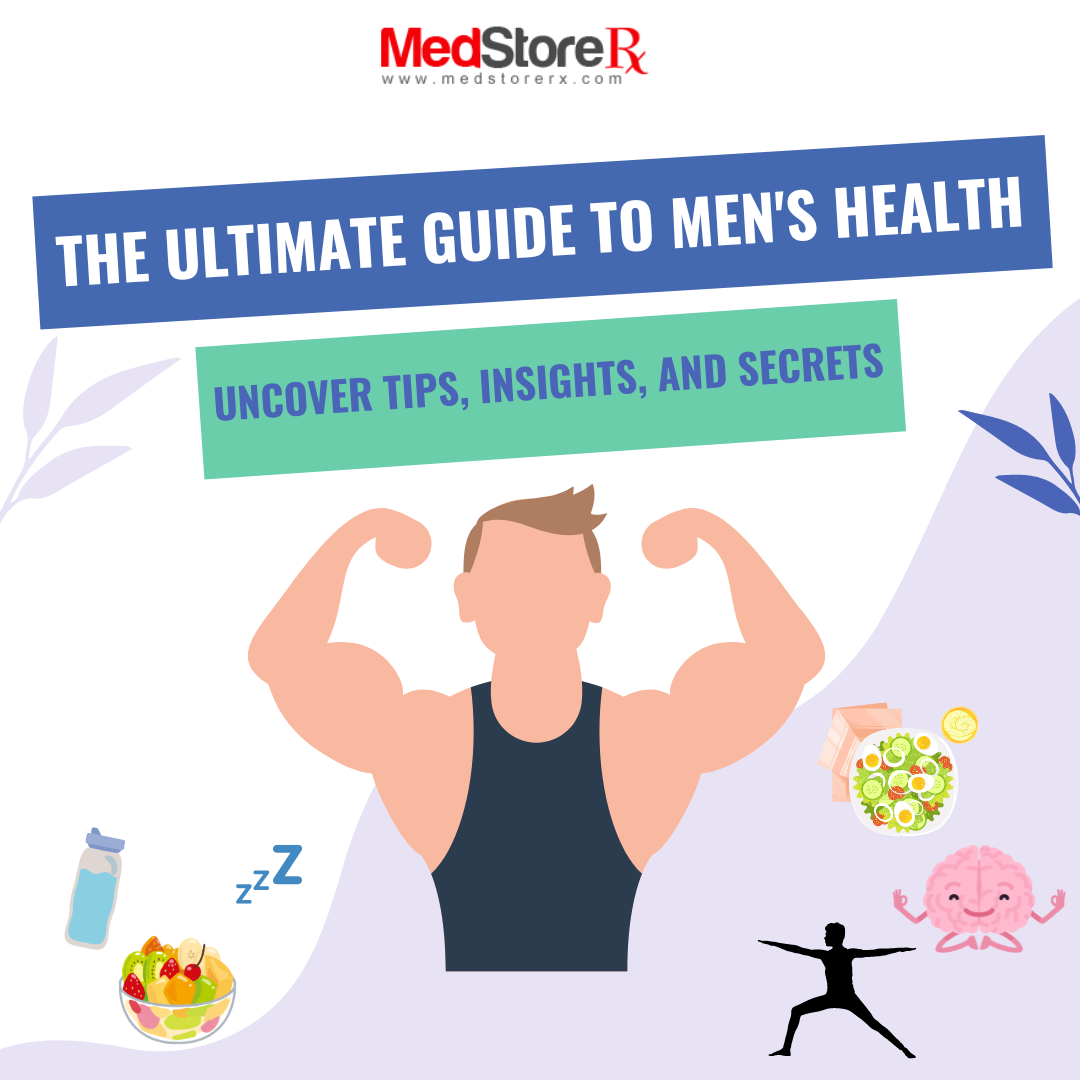
Welcome to the ultimate guide to men’s health! In this comprehensive article, we will uncover a treasure trove of tips, insights, and secrets to help you prioritize and optimize your well-being. Whether you’re a man looking to maintain your health or someone who cares about the men in your life, this guide is for you.
Across these pages, we will delve into various aspects of men’s health, including physical fitness, mental well-being, nutrition, sexual health, and more. You can expect a wealth of expert advice, evidence-based research, and practical strategies to enhance every facet of your life.
We understand the unique challenges that men face when it comes to health. That’s why we have curated a collection of articles that address common concerns such as heart health, prostate health, stress management, and maintaining a healthy work-life balance.
So, whether you’re concerned about preventing illness, improving longevity, or simply optimizing your day-to-day well-being, this guide has you covered. Let’s embark on this journey together and unlock the secrets to a healthier, happier you. Get ready to take charge of your health and transform your life starting today!
Common health issues in men
Men, just like women, have their own set of unique health challenges. Understanding these common health issues can help you take proactive steps to prevent and manage them.
One of the primary concerns for men is heart health. Heart disease is the leading cause of death among men worldwide. Factors such as high blood pressure, high cholesterol, smoking, and obesity contribute to this risk. Regular check-ups, a healthy diet, exercise, and stress management are key to maintaining a healthy heart.
Prostate health is another significant concern for men. Prostate cancer is the most common cancer among men, but early detection and treatment significantly improve outcomes. Regular screenings and discussions with your doctor can help detect any potential issues early on.
Additionally, mental health is an essential aspect of overall well-being. Men often face societal pressures to be strong and stoic, which can make it challenging to seek help for mental health issues. Depression, anxiety, and stress can take a toll on both physical and mental health. It’s crucial to prioritize self-care and seek support when needed.
Importance of regular check-ups and screenings
Regular check-ups and screenings are vital for maintaining optimal health and detecting any potential issues early on. Many health conditions can be asymptomatic in their early stages, making routine screenings even more crucial.
During a check-up, your healthcare provider will assess your overall health, review your medical history, and perform various tests. These may include measuring blood pressure, checking cholesterol levels, and conducting blood tests to evaluate organ function. Regular check-ups allow for early detection of any abnormalities and help establish a baseline for future comparisons.
Screenings are specific tests performed to identify potential health problems. For example, prostate-specific antigen (PSA) tests are used to screen for prostate cancer, while colonoscopies are performed to detect colorectal cancer. Regular screenings can detect diseases in their early stages when treatment is most effective.
It’s important not to neglect regular check-ups and screenings, even if you feel healthy. Prevention is always better than cure, and early intervention can save lives. Make it a priority to schedule routine appointments with your healthcare provider and follow their recommendations for screenings based on your age and risk factors.
Nutrition and diet tips for men’s health
A balanced diet plays a crucial role in maintaining optimal health for men. Proper nutrition ensures that your body receives the essential nutrients it needs to function at its best. Here are some tips to help you make healthier choices when it comes to your diet:
- Eat a variety of fruits and vegetables: Aim to include a colorful array of fruits and vegetables in your meals. They are packed with vitamins, minerals, and antioxidants that support overall health and reduce the risk of chronic diseases.
- Choose whole grains: Replace refined grains with whole grains such as brown rice, quinoa, and whole wheat bread. Whole grains provide more fiber and nutrients, promoting better digestion and reducing the risk of heart disease.
- Opt for lean protein sources: Include lean sources of protein in your diet, such as skinless poultry, fish, beans, and tofu. These provide essential amino acids and help build and repair tissues, support immune function, and regulate hormones.
- Limit processed and sugary foods: Processed foods, such as fast food, snacks, and sugary beverages, tend to be high in unhealthy fats, added sugars, and sodium. These can contribute to weight gain, increased cholesterol levels, and an increased risk of chronic diseases.
- Stay hydrated: Drink an adequate amount of water throughout the day to stay hydrated. Water is essential for various bodily functions, including digestion, circulation, and temperature regulation.
Remember, small changes to your diet can have a significant impact on your overall health. Aim for a well-balanced diet that includes a variety of nutrient-dense foods to fuel your body and support optimal well-being.
Exercise and fitness for men
Regular physical activity is crucial for men’s health and well-being. Exercise offers numerous benefits, including improved cardiovascular health, weight management, enhanced mood, increased muscle strength, and reduced risk of chronic diseases. Here are some key tips to incorporate exercise into your routine:
- Find activities you enjoy: Choose activities that you genuinely enjoy, whether it’s running, cycling, swimming, or playing a sport. When you enjoy what you’re doing, you’re more likely to stick with it and make exercise a regular part of your life.
- Aim for a mix of cardiovascular and strength training: Include both cardiovascular exercises, such as running or biking, and strength training exercises, such as weightlifting or bodyweight exercises. Cardiovascular exercises improve heart health, while strength training helps build muscle and maintain bone density.
- Make it a habit: Schedule regular exercise sessions into your weekly routine. Consistency is key when it comes to reaping the benefits of exercise. Aim for at least 150 minutes of moderate-intensity aerobic activity or 75 minutes of vigorous-intensity aerobic activity per week, along with strength training exercises at least twice a week.
- Listen to your body: Pay attention to how your body feels during and after exercise. If you experience pain or discomfort, it’s important to modify or stop the activity to prevent injury. Gradually build up the intensity and duration of your workouts to avoid overexertion.
- Stay motivated: Find ways to stay motivated and accountable. Set realistic goals, track your progress, and reward yourself for reaching milestones. Consider exercising with a friend or joining a fitness class or group to stay motivated and make exercise more enjoyable.
Remember, it’s never too late to start incorporating exercise into your life. Whether you’re a beginner or an experienced athlete, finding ways to move your body regularly is essential for your overall health and well-being.
Mental health and stress management
Good mental health is just as important as physical health for men’s well-being. However, men often face unique challenges when it comes to mental health, such as societal expectations and stigma surrounding seeking help. Here are some strategies for maintaining good mental health and managing stress:
- Prioritize self-care: Make time for activities that bring you joy and relaxation. Engage in hobbies, spend time with loved ones, practice mindfulness or meditation, or engage in activities that help you unwind and recharge.
- Seek social support: Build and maintain strong social connections. Surround yourself with supportive friends and family members who can provide a listening ear and offer guidance when needed. Participate in social activities or join clubs or organizations that align with your interests.
- Communicate openly: Don’t be afraid to express your feelings and emotions. Bottling up emotions can lead to increased stress and negatively impact your mental well-being. Find trusted individuals with whom you can share your thoughts and concerns.
- Practice stress management techniques: Find healthy ways to cope with stress, such as deep breathing exercises, physical activity, or engaging in hobbies. Consider incorporating practices like yoga or meditation into your routine to promote relaxation and reduce stress levels.
- Know when to seek help: If you’re experiencing persistent feelings of sadness, anxiety, or hopelessness, or if your mental health is affecting your daily life, it’s important to seek professional help. Mental health professionals can provide guidance, support, and appropriate treatment options.
Remember, taking care of your mental health is not a sign of weakness. It’s a courageous step towards living a fulfilling and balanced life. Prioritize your mental well-being just as you would your physical health.
Tips for maintaining a healthy weight
Maintaining a healthy weight is essential for overall health and reducing the risk of chronic diseases. Here are some tips to help you achieve and maintain a healthy weight:
- Eat mindfully: Pay attention to your body’s hunger and fullness cues. Eat when you’re hungry and stop when you’re satisfied. Avoid distractions, such as eating in front of the TV or while working, which can lead to overeating.
- Portion control: Be mindful of portion sizes. Use smaller plates and bowls to help control portions. Aim to fill half of your plate with vegetables, one-quarter with lean protein, and one-quarter with whole grains.
- Limit added sugars and unhealthy fats: Be mindful of the amount of added sugars and unhealthy fats in your diet. Choose healthier cooking methods such as baking, grilling, or steaming instead of frying. Opt for unsaturated fats found in foods like avocados, nuts, and olive oil.
- Stay active: Regular physical activity is key to maintaining a healthy weight. Aim for a combination of cardiovascular exercises and strength training to burn calories and build muscle.
- Get enough sleep: Poor sleep has been linked to weight gain and increased cravings for unhealthy foods. Aim for 7-8 hours of quality sleep each night to support overall health and weight management.
Remember, maintaining a healthy weight is a long-term commitment. Focus on making sustainable lifestyle changes rather than resorting to quick-fix diets or extreme measures. Consult with a healthcare professional or registered dietitian for personalized guidance and support.
Sleep and its impact on men’s health
A good night’s sleep is crucial for men’s overall health and well-being. Sleep plays a vital role in various bodily functions, including brain health, hormone regulation, immune function, and metabolism. Here are some tips to improve the quality of your sleep:
- Establish a consistent sleep schedule: Go to bed and wake up at the same time every day, even on weekends. This helps regulate your body’s internal clock and promotes better sleep quality.
- Create a sleep-friendly environment: Make your bedroom a calm and comfortable space for sleep. Keep the room cool, dark, and quiet. Use blackout curtains, earplugs, or a white noise machine if necessary.
- Limit exposure to electronic devices before bed: The blue light emitted by electronic devices can interfere with your sleep-wake cycle. Avoid using electronic devices, such as smartphones and tablets, for at least an hour before bedtime.
- Practice a relaxing bedtime routine: Engage in activities that promote relaxation before bed. This can include reading a book, taking a warm bath, practicing deep breathing exercises, or listening to calming music.
- Avoid stimulating substances: Limit your consumption of caffeine and alcohol, especially close to bedtime. Both substances can disrupt sleep patterns and affect the quality of your sleep.
Remember, prioritizing quality sleep is essential for your overall health and well-being. If you’re experiencing persistent sleep issues, consider speaking with a healthcare professional who can help identify underlying causes and recommend appropriate solutions.
Sexual health and wellness
Sexual health is an integral part of men’s overall well-being, and maintaining good sexual health involves various aspects. Here are some tips for promoting sexual health and wellness:
- Practice safe sex: Use condoms consistently and correctly to protect against sexually transmitted infections (STIs). If you’re in a monogamous relationship, consider getting tested for STIs together.
- Communicate with your partner: Open and honest communication with your partner is crucial for a healthy sexual relationship. Discuss desires, concerns, and any potential issues that may arise.
- Maintain a healthy lifestyle: Staying physically active, eating a balanced diet, managing stress, and getting enough sleep can all contribute to better sexual health. These lifestyle factors can improve blood circulation, hormone balance, and overall energy levels.
- Seek help for sexual concerns: If you’re experiencing difficulties or concerns related to sexual health, don’t hesitate to seek professional help. Sexual concerns are common and can often be addressed with appropriate treatment or counseling.
- Prioritize emotional intimacy: Emotional connection and intimacy are important components of a satisfying sexual relationship. Take the time to nurture emotional bonds with your partner through open communication, quality time together, and shared experiences.
Remember, sexual health is a personal and unique aspect of well-being. It’s essential to prioritize your sexual health and seek help when needed to ensure a fulfilling and satisfying sexual life.
Conclusion and final thoughts on men’s health
Congratulations on completing this ultimate guide to men’s health! We have covered a wide range of topics, including common health issues, the importance of regular check-ups, nutrition and diet tips, exercise and fitness, mental health and stress management, maintaining a healthy weight, sleep, and sexual health.
Remember, your health is a lifelong journey that requires consistent effort and care. By implementing the tips, insights, and secrets shared in this guide, you can take proactive steps toward optimizing your well-being and living a healthier, happier life.
Don’t forget to prioritize self-care, seek support when needed, and make your health a top priority. Regular check-ups, a balanced diet, regular exercise, and good mental health practices are all essential for maintaining optimal health.
Thank you for joining us on this enlightening journey. Here’s to a future filled with improved health, longevity, and well-being. Take charge of your health today and unlock the secrets to a healthier, happier you!


 Cart : 0 items - $0.00
Cart : 0 items - $0.00










